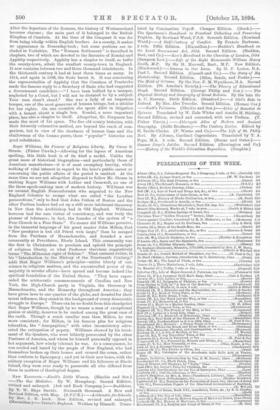Roger Williams, the Pioneer of Religious Liberty. By Oscar S.
Straus. (Fisher Unwin.)—Allowing for the lapses of American spelling, this little book is of its kind a model. Unlike the great mass of historical biographies—and particularly those of American manufacture—it is of most exemplary brevity, while nothing of vital interest in regard to the hero's public career or concerning the public affairs of the period is omitted. At the same time we are not altogether disposed to follow Mr. Straus in ranking Roger Williams with Luther and Cromwell, as one of the three epoch-making men of modern history. Williams was an earnest English Nonconformist who migrated to the New England Colonies to escape what are called " the Laudian persecutions," only to find that John Cotton of Boston and the other Puritan leaders had set up a still more intolerant theocracy in New than the Archbishop had in Old England. Williams however had the rare virtue of consistency, and was truly the pioneer of tolerance; in fact, the founder of the system of "a Free Church in a Free State." No sooner did Williams perceive, in the immortal language of his great master John Milton, that "New presbyter is but old Priest writ large," than he escaped from the Puritans of Massachusetts, and founded a new community at Providence, Rhode Island. This -community was the first in Christendom to proclaim and uphold the principle of religious liberty, or what Professor Gervinus suggestively terms " The Miltonian right of Schism." That eminent writer, in his " Introduction to the History of the Nineteenth Century," adds that Roger -Williams's principles—entire liberty of con- science in religious matters, and the uncontrolled power of the majority in secular affairs—have spread and become indeed the spiritual foundation of the United States. " They have super- seded the aristocratic commencements of Carolina and New York, the High-Church party in Virginia, the theocracy in Massachusetts, and the Monarchy throughout America ; they have given laws to one quarter of the globe, and dreaded for their moral influence, they stand in the background of every democratic struggle in Europe." There can be no doubt from this standpoint that Roger Williams, though by no means a man of exceptional genius or ability, deserves to be ranked among the great ones of the earth. Though a much smaller man than Milton, he was more consistent; for Milton, in his famous plea for religious toleration, the " Areopagitica," with utter inconsistency advo- cated the extirpation of popery. Williams showed by his treat- ment of the Quakers, who were bitterly persecuted by the other Puritans of America, and whom he himself personally opposed in hot argument, how wisely tolerant he was. As a consequence, he was reviled and hated by the people of New England, who had themselves broken up their homes and crossed the ocean, rather than conform to Episcopacy ; and yet in their new home, with the solitary exception of Roger Williams and his followers at Rhode Island, they were ever ready to persecute all who differed from them in matters a theological dogma.


















































 Previous page
Previous page